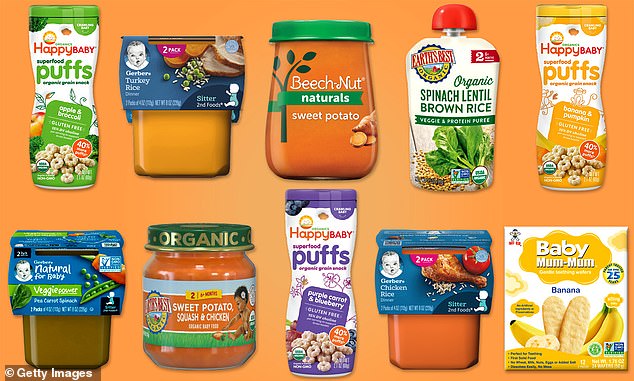California becomes first US state to force baby food makers to test products for dangerous metals
- A California law would require baby food manufacturers to test products for metals
- The companies will also be required to post results online for consumers to see
- READ MORE: California becomes first US state to ban cancer-causing additives
Baby food makers in California would be forced to test for toxic metals and publish the results on the products’ websites, according to a new bill.
Gavin Newsom signed the bill on Tuesday, which is the first measure of its kind in the US to require companies to disclose how much metal is in food. The goal of the bill is to get these manufacturers to start removing the pollution, which has been linked to developmental issues, low IQ and cancer.
Brian Ronholm, director of food policy at watchdog Consumer Reports, said: ‘The last thing parents expect to find in baby food are toxic heavy metals such as arsenic and lead that could threaten their child’s health and well-being.’
‘California’s new law fills a critical gap in the FDA’s efforts to reduce heavy metals in baby food. Requiring food companies to test their products and post the results online will encourage them to remove dangerous levels of heavy metals from their products and help keep babies safe and healthy.’

Newsom’s new law would require baby food manufacturers to post metal amounts on their websites starting in 2025 and disclose using a QR code on the product label if the Food and Drug Administration (FDA) proposes a limit on that material
Starting in 2024, the law will require baby food manufacturers to test a sample of each of their products each month for arsenic, cadmium, lead and mercury. They will then have to provide the results to the California Department of Health upon request.
The law will require the manufacturers to post the results on their websites from 2025 and disclose using a QR code on the product label if the Food and Drug Administration (FDA) proposes a restriction on that material.
The FDA has previously set limits on these metals but does not strictly enforce them. The agency does not require final product testing to determine whether manufacturers meet limits, and it does not require companies to disclose test results to consumers.
An investigation by Consumer Reports earlier this year found that the majority of popular baby foods still contain lead, arsenic and cadmium.
The Centers for Disease Control and Prevention (CDC) warns that there is no safe level of lead exposure. Young children exposed to it can suffer in the development of their brain and nervous system.
About 2.5 percent of children under the age of five are exposed to dangerous levels of lead, experts say.
As a result, they may have delayed growth, learning, behaviour, hearing and speech problems.
And the threat continues into adulthood. A 2018 study published in The Lancet suggested that even low levels of lead from food and other sources contributed to 400,000 deaths per year, half of which were from heart disease.
In addition, arsenic, which has been in several products, is a carcinogen that increases the risk of bladder, lung and skin cancer.
It is also linked to neurodevelopmental disorders and higher chances of infant mortality.
The new bill comes days after Newsom signed an initiative that banned several additives proven to cause cancer.
